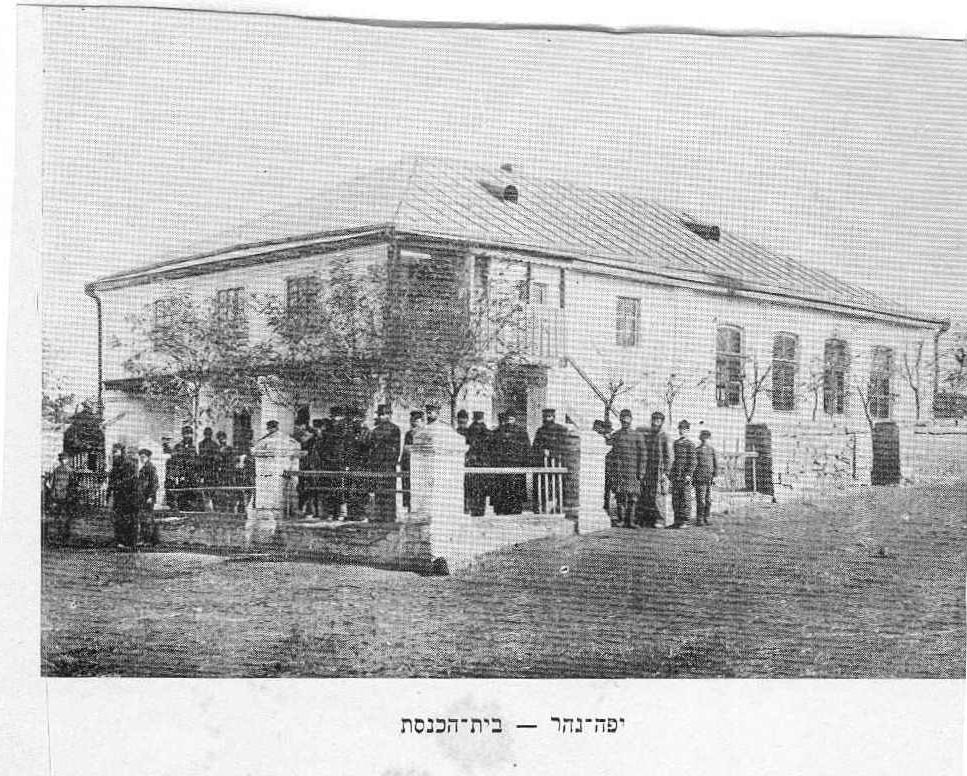David Tverdovsky
My father, David Tverdovsky, was born and grew up in Yefe Nahar (Beautiful River in Hebrew, also called
Efingar in Russian) in 1906. The colony (located on the Ingulets River, Kherson Province) was one of
the many Jewish colonies that were settled in southern Ukraine in the beginning of the nineteenth
century.
His great-grandfather Avraham Ber Tverdovsky was one of the founders of the colony, and his grandfather
Moshe was one of the first kids born in the colonies. Moshe married Dvora Gitel Medem (one of the first
kids born in Novopoltavka).

The story, linked below,
describes a trip in which Grandfather Moshe is taking his grand-kids on a horse-pulled
coach to visit the colony’s fields on the evening before Passover (to allow Grandmother to prepare the
house for the Passover Seder ceremony and meal). During the trip, Grandfather Moshe tells his grand-kids and
the reader about the history of the colony and the hardship of the first settlers.
According to the story, my father’s ancestors came from Nevel (Vitebsk oblast) in Belarus to settle in this
area. During that time, Tzar Alexander the First forced Jews to leave their cities in the northern areas of
the Pale of Settlement. The settlers traveled by foot over a huge distance from Belarus to southern Ukraine,
a trip that killed most of the people of the travelling party.
When he was a teenager, my father joined a Zionist movement that started to gain momentum among the Jewish
youths of the area (and all over Eastern Europe). He was arrested by Stalin's secret police (Checka)
for
giving a lecture, in Yiddish, against the plan to establish a Jewish state in Uganda. He was sent to Tiflis,
Georgia for seven years. In exile, he lost the ability to sleep well, as the Russians put him in the same
cell with a political prisoner. The guards used to take these political prisoners out during the night for
execution and he slept very lightly to make sure to wake up when they came, so that they did not take the
wrong person. Later on during his life, his family had to keep absolutly quite at home when he was sleeping
in order not to wake him up.
My father met my mother Rosa in Nikolayev before the exile, probably in a Zionist gathering in Nikolayev.
My mother
was also sent to Tiflis, where she worked as a teacher. They got together again right after he got out of
prison. He was released as part of a prisoner exchange agreement between Russia and the United States. He
went to visit his parents and the rest of the family in Yefe
|
Nahar right after that. Most of the family and his parents
left Yefe Nahar sometime between 1928 and 1932 because of the famine in Ukraine and the Sovietization of the
Jewish colonies. My parents left Ukraine and arrived in Palestine in 193l.
My father used to tell us many stories about his life in the Siberian Gulag. For example, he told us that
they used
a spoon and a string to ice-fish in the frozen river. A postcard he kept from Tiflis shows a desert full of
snow and ice. In Palestine, our family lived in a hut several blocks down the road from the center of the
town of
Ra’anana on Rambam Street. They settled in Ra’anana where my father’s aunt and her family lived. They also
came from the Kherson area colony by the name of Novopoltavka.
Our family was always poor. My father started to work in agriculture picking oranges. However, he was
allergic to the citric acid and had to find another occupation. He became a diamond cutter but his hand
was infected from the chemicals used, and he had to stop that as well. Later on, he became a clerk for the
Jewish Agency and Israel Government, working with new immigrants.
The family lived initially in a hut with
a dirt floor. I remember my father building and painting the house by himself, despite the fact that he
suffered from his heart. I bought my parents their first small refrigerator from the money I saved on my
small salary as a sailor in the Israeli Navy (they were probably the last ones to have a refrigerator in
Israel). To supplement their income they grew chickens in their backyard. I remember my parents bringing
the entire coop to the kitchen on hot days to make sure that the chickens did not suffer from the heat. My
mother used to sew shirts from pillow cases and turn collars around when they were worn out. She used to
go to the market just before closing time and buy the rejects to save money. She did not have shoes, so she
waited until my father came home to use his.
My father was a wonderful story teller. He was a Yiddish writer, but a hard life kept him away from becoming
famous. His Hebrew was impeccable, despite the fact that it was not his mother tongue. He won a prize from the
American Yiddish newspaper the Goldene Gate for
a short story (Ba’arava – On the Prairie) about his childhood. This story was later
translated into Hebrew by Shimshon Meltzer (with the
title of Erev Pesach) and was published in the book Chaklaim Yehudim Bearvot Russia
(Jewish Farmers on
Russian Fields), published by Hashomer Hatsair, Merchavia, Israel, 1965.
The story, in Hebrew,
Ba'arava, is attached here.
–– Nehama Tverdovsky
|